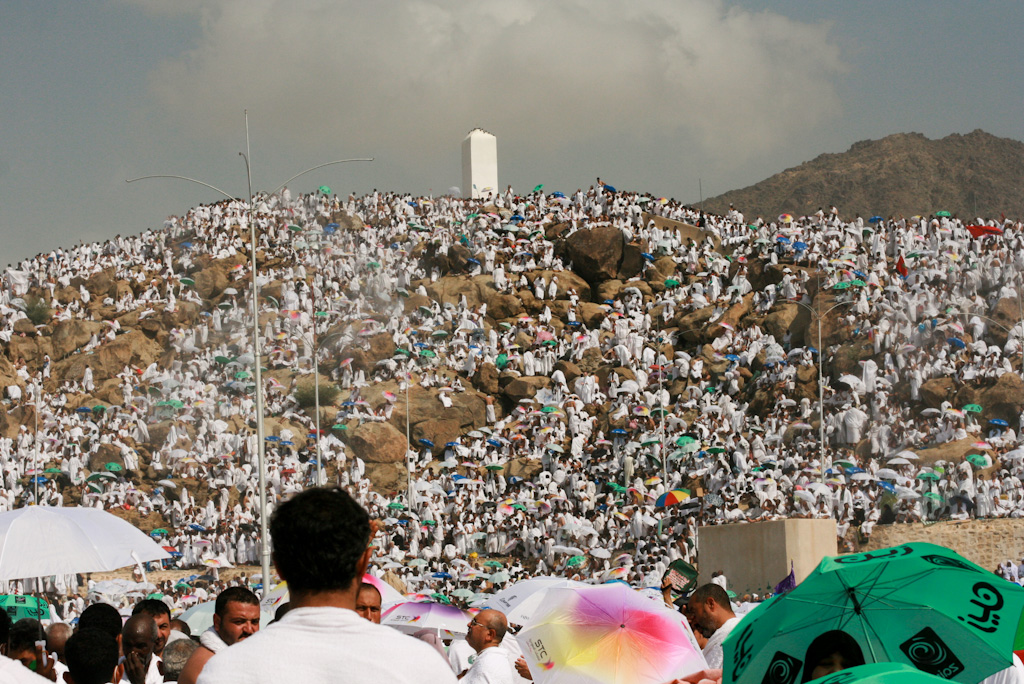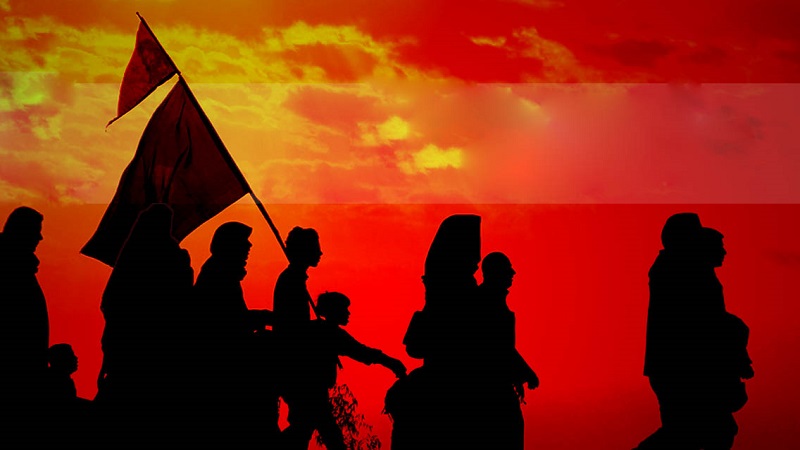

The day of Arafah
Once Imam Sajjad (AS), the fourth Shiite Imam, heard a beggar asking people for charity on the 9th day of Dhu al-Hajjah, the day of Arafah. Imam Sajjad (AS) was surprised and said:
Shame on you! Are you asking somebody for help other than Allah on this holy day? While on this day, even the fetus in the uterus hopes that Allah might grant them a happy future in the world (1)
As Imam Sajjad (AS) said, the day of Arafah is the day of Allah’s great mercy toward humanity. There are two important occasions in the Islamic calendar that are considered as the most important ones: the day of Arafah and the night of Qadr.
The Arafat plain
On the second day of their pilgrimage, hajj pilgrims must stay in the Arafat plain from noon until sunset, praying and seeking forgiveness from Allah Almighty and thanking Him for the opportunity to perform Hajj. This is known as “Wuquf in Arafat”. The Arafat plain is a special place near Mecca, and it is said that no one has ever sinned in this plain.
There is also a mountain named Arafah in this plain, also known as “Jabal ar-Rahmah” which means “the mountain of Mercy”. About this mountain, Imam Baqir (AS) said:
Anyone who stays on this mountain, Allah will grant them their wishes. For the good people, Allah will grant all their wishes whether they are about this world or the Hereafter but for the bad people, only their worldly wishes will be granted (2)
Prophet Muhammad (PBUH & HP) stood on this mountain in his last days and bid farewell to his followers.
Praying in this day
The most important practice for all the pilgrims in Mecca and those who couldn’t make it there is praying.
Ibrahim ibn Hashim, one of the Shiite scholars, once saw Abdullah ibn Jundab, one of the pupils of Imam Kazim (AS), in the Arafat plain. He said, “I saw no one like him in the plain; his hands were up in prayer all the time, shedding tears that dropped onto the earth. When people left, I told him ‘I didn’t see no one praying like you in this plain’. Abdullah ibn Jundab replied ‘I swear to Allah that I prayed only for my brothers (other Shiites) because Imam Kazim (AS) told me that anyone who prays on this day for their brothers will be called from the heavens, and Allah has given them thousand more things than what they wished for their brothers’”. (3)
Imam Ali (AS) said:
It is not obligatory for the people to gather in the Arafah Day, except if they are in Mecca, but it’s no problem if people gather in the other cities and call upon Allah together. (4)
Sudair as-Sirafy, one of the pupils of Imam Sadiq (AS), asked him about fasting in the Arafah day. Imam Sadiq (AS) said “My father wouldn’t fast on this day [and I won’t neither]”. Sudair asked: “why don’t you?” Imam Sadiq (AS) said:
The Day of Arafah is a day of supplicant and prayer. Therefore, I worry that fasting would make me weak and I couldn’t pray enough, so I don’t want to fast on this day. (5)
There are some famous prayers narrated from the Shiite Imams that should be recited on this day. Imam Hussain (AS), before he moved to Karbala, stayed in the Arafat Plain and prayed humbly with his hands raised, asking Allah for forgiveness and mercy. This beautiful prayer is full of teachings about Allah and its recitation is highly recommended. Shias mostly go to holy places like mosques and shrines and recite this prayer together.
Imam Sajjad (AS) also has a prayer exclusively for this day, which is written in the book “Sahifah as-Sajjadiah”.
Other recommended practices
Other than praying, there are some rituals mentioned in the hadiths that one can do on this day:
• Those who can’t make it to Mecca can visit the shrine of Imam Hussain (AS) in Karbala. In this regard Imam Sadiq (AS) said,
Anyone who makes pilgrimage to Karbala and washes their body in the Forat (a famous river there), and then goes to the shrine of Imam Hussain (AS), for every step they take, Allah considers it like a pilgrimage of Hajj”. (6)
• Giving charity to the needy ones
• Performing ghusl (a ritual bath)
• Fasting. Imam Ridha (AS) said,
Fasting on the day of Arafah is equal to fasting for a year. (7)
However, as Imam Sadiq (AS) mentioned, if fasting weakens you and hinders your prayer, it’s better not to fast.
Resources
- Man la Yahduruhu al-Faqih, Sheikh Saduq, vol.2, pg.211
- Vasa’il ash-Shia, Sheikh Hurr al-Ameli, vol.13, pg.546
- Vasa’il ash-Shia, Sheikh Hurr al-Ameli, vol.13, pg.544
- Vasa’il ash-Shia, Sheikh Hurr al-Ameli, vol.13, pg.561
- I’lal ash-Shara’I, Sheikh Saduq, vol.2, pg.386
- Al-Kafi, Sheikh Koleini, vol.4, pg.580
- Al-Istibsar, Sheikh Toosi, vol.2, pg.133
Share This Article

What Is the Significance of Number Forty in Islam?
In different cultures or religions, people pay special attention to some specific numbers. For example, numbers 7, 40, and 70 are amongst lucky numbers, and number 13 is known to be a cursed number in some cultures. However, the significance of the number 40 among many cultures and religions is very noticeable. Therefore, this question may arise that what is so special about this number? Can number forty bring luck and happiness to people? Is it a fact or just a superstition? Let’s have a quick look at the background of the number forty in different religions.
Number Forty in Christianity
Number forty has been mentioned in the Bible in different verses:
1- Jesus (PBUH) fasted "forty days and forty nights" in the Judean desert. (Matthew 4:2, Mark 1:13, Luke 4:2).
2- Forty days was the period from the resurrection of Jesus to the ascension of Jesus (PBUH). (Acts 1:3).
3- Rain fell for "forty days and forty nights" during the Flood (Genesis 7:4). [1]

Number Forty in Islam
Number forty is mentioned in the Quran four times:
1 & 2- Prophet Moses (PBUH) spent 40 days on Mount Sinai, where he received the ten commandments (2: 51, 7: 142).
3- Prophet Moses (PBUH) and his people were lost in the desert for forty years. (5: 26)
4- As mentioned in the Quran, It seems that the age of forty should be the time when a human being is supposed to reach his/her intellectual perfection and understanding of life. This is the time when one can plan the rest of his/her life in a way to gain the most from this world for the hereafter:
“… When he comes of age and reaches forty years, he says, ‘My Lord! Inspire me to give thanks for Your blessing with which You have blessed my parents and me, and that I may do righteous deeds which please You, and invest my descendants with righteousness. Indeed I have turned to you in penitence, and I am one of the Muslims.” (46: 15)
It is narrated from Prophet Muhammad (PBUH & HP) that “When one becomes forty years old, Allah tells his two guardian angels, ‘From now on, be strict on him and note every small and big deed he does’” [2]. The narration emphasizes that the age of forty shapes the personality of a person, and if he/she is still unable to manage his/her life, it is his/her fault for having wasted his/her life in the wrong way.
Number Forty in Narrations and the Conduct of Scholars
There are so many narrations from Prophet Muhammad (PBUH & HP) that mention number forty. Here we list a few of these narrations:
1- “He who purifies his faith for Allah for forty days, Allah will flow the springs of wisdom from his heart to his tongue” [3].
2- “The prayers of the one who drinks wine are not accepted for forty days unless he repents” [4] [i].
3- “The prayers of a person who gossips would not be accepted for forty days and nights” [5].
Some scholars say that number forty is used to emphasize the significant amount of something.
4- “One who leaves his house to gain a gate of knowledge by which he deviates the wrong towards righteous, or deviance to guidance, his deed is equal to forty years worship of a worshipper” [6].
The Fortieth Day after Burial (Arba’een)
In some cultures, it is a tradition that forty days after a passed-away person’s burial, close relatives and friends gather in a place with the family of the late person and remember the passed-away person and wish peace and patience for his/her family. In this manner, they show the family of the deceased person that they are not alone, and people will help them and support them when required.
It is based on this tradition, taken from the conduct of the Prophet (PBUH & HP) and his Progeny (AS) that Muslims travel to Karbala on the 40th (Arba’een) martyrdom commemoration of Imam Hussain (AS) and his companions; Not only to sympathize with the household of Prophet (PBUH & HP) on this event, but to show their gratefulness for their courage in preserving the true Islam and the conduct of the Prophet (PBUH & HP). More importantly, Muslims show that the aim of Imam Hussain (AS) is still observed and taken care of.

Is It OK to Follow the Rules Related to Number Forty?
Based on the importance that some verses of the Quran and narrations of the Prophet (PBUH & HP) give to number forty, Muslim scholars, especially those who are fond of Islamic mysticism and self-purification, pay special attention to number forty in their conducts and life-style.
Therefore, there is nothing wrong with trying to benefit from the blessings that the number forty may have. And it is trustworthy because Allah and the Prophet (PBUH & HP) have mentioned it. However, normal human beings do not have a real knowledge of numbers and the wisdom behind them.
A Logical Interpretation
As mentioned in a narration earlier, the Prophet (PBUH & HP) says that if you purify your faith for forty days, you will see a great result. [7] The reason is that if one works so hard on his/her spirituality to be able to purify his faith for forty days, it will become a habit for him. Allah says in the Quran, “Be wary of Allah, and Allah will teach you, and Allah has knowledge of all things” (2: 282), which is very much relevant to the mentioned narration. Therefore, one interpretation of doing something for forty days is that whatever you do for this long period, with persistence, will become your habit, and after something becomes a habit, you can easily go on with it for the rest of your life.
Conclusion
To sum up, there is no such thing as lucky or cursed numbers. And instead of trying to find luck in numbers, one should work hard to develop his personality, spirituality, knowledge, and wisdom.
But the reason number forty has been mentioned by the Prophet (PBUH & HP), and Islamic scholars might be a symbol of enormousness, meaning that if you persist in doing something for a considerable amount of time, it will become your habit. However, the reason why they insisted on number forty might be because they wanted to spread unique conduct and a specific discipline among the believers.
Notes:
[i] Some may think that if praying and fasting are not accepted for forty days after drinking, then it will be OK if they do not pray or fast for forty days after they drink. It should be noted that praying and fasting are still compulsory for the person who drinks. However, the sin is counted so huge that they should repent from it, deciding not to commit it again, and say their prayers and perform fasting and other obligations.
References
- number in religion
Al-kafi, Vol 8, P. 108
Bihar al-Anwar, vol. 67, p. 242
Mustadrak al-Wasa’il, vol. 17. P. 57
Al-Kafi, Vol. 6, p. 400
Amali- e Tousi, p. 118
Bihar al-Anwar, vol. 67, p. 242
Read More

How does Islam define wisdom?
The Cambridge dictionary defines wisdom as using knowledge and experience to make good decisions and judgments. (1) The most similar equivalent for this word in Arabic is the word “حکمة” (“Hikmah”) which denotes justice, knowledge and tolerance. (2)
This word has been used so many times in the holy Quran and has a special meaning in Islamic literature. The holy Quran says:
Allah grants wisdom to whomever He wishes, and he, who is given wisdom, is certainly given an abundant good, and none takes admonition except those who possess intellect. (2:269)
About this verse of the Quran, Imam Sadiq (AS) says:
(In this verse) Allah The Almighty has portrayed the intellectuals in the best way. (3)
Hikmah is the message of the Prophets
Allah The Almighty has rapidly pointed out this fact that He has sent the prophets with “Hikmah” and they should teach people how to be wise. The holy Quran says:
Allah certainly favored the faithful when He raised up among them an apostle from among themselves to recite to them His signs (the verses of Quran) and to purify them and teach them the Book and wisdom, and earlier they had indeed been in manifest error. (3:164)
And:
There have already come to them, reports (via the Prophets) containing admonishment, [and representing] far-reaching wisdom; but warnings are of no avail! (4:54)
Also:
Invite to the way of your Lord with wisdom and good advice and dispute with them in a manner which is the best manner.. (16:125)
And:
When Jesus brought those manifest proofs, he said, ‘I have certainly brought you wisdom, and [I have come] to make clear to you some of the things that you differ about, so be wary of Allah and obey me. (43:63)
Allah almighty even says that the holy Quran is a book full of wisdom:
These are among [precepts] that your Lord has revealed to you of wisdom. (17:39)
These are the signs of the wise Book (31:2)

What is wisdom in the eyes of Allah?
The original meaning of the word “Hikmah” is wisdom, knowledge and tolerance and the ability to use your knowledge in the best way; but Allah The Almighty prefers some special kinds of wisdom. The verses of the Quran and the hadiths, try to clarify the true meaning of wisdom from Islamic sight.
Obedience towards Allah
• Abu-Basir, one of the brilliant pupils of Imam Sadiq (AS) once asked him about the verse; “He grants wisdom to whomever He wishes (2:269)”. Imam Sadiq (AS) replied, “That (Wisdom) is obeying Allah and knowledge about Islam” (4)
• Imam Baqir (AS) also says that “Hikmah” means: “not to commit the sins that Allah has ordained for it the Hell as a punishment” (5)
• Once Prophet Muhammad (PBUH & HP) asked a group of people who they are.
They said that they are some faithful people.
The Prophet (PBUH & HP) asked: “What are the signs of your faith?”
They said: “We are content about what Allah has planned for us and we are submissive to the order of our God and we trust in him for everything.”
The Prophet said: “You are so knowledgeable and wise the way that your wisdom can almost make you like prophets.” (6)
Knowing our Imams
Imam Sadiq (AS) about the verse “…and he, who is given wisdom, is certainly given an abundant good (2:269)” said ,“The abundant good is knowing Imam Ali (AS) and the other Imams (AS)” (7)
He also said: “(The “Hikmah” mentioned in the verse is) obeying Allah and knowing the Imam (of your time)”
In Arabic, the word “جهل” (Jahl) means “Ignorance”, which can be considered the opposite of “Hikmah”. So anyone who is not “Hakim” (wise) is “Ignorant” in Islamic culture. There is a hadith narrated from the Prophet (PBUH & HP) in which he said:
Anyone who dies while they don’t have an Imam will have died like a person in the ages of ignorance (8)
This hadith has been narrated by all Muslims’ Sunnis and Shiites and the authenticity of this record is undeniable.
About knowing the Imam, Imam Sadiq (AS) also said:
Anyone from among the followers of Prophet Muhammad (PBUH & HP) who understands the status and the rights of their Imam, will find how delightful having faith is.(9)
Understanding Religion
The last meaning of “Hikmah” mentioned in the Hadiths is “Fiqh” (jurisprudence) which means “Understanding”. In Islamic culture, this word is employed to define a deep understanding of religion and profound knowledge about it . (10)
Imam Sadiq (AS) said:
“Hikmah is the knowledge about religion and understanding it (Fiqh). Therefore, anyone who understands the teachings of the religion is a “Hakim” (a wise person). Indeed above all, Satan wishes the ones who deeply understand religion, to be dead.” (11)
The Holy Prophet (PBUH & HP) said:
Allah has given me the Quran and he also gave me Hikmah just like the Quran and every house which therein is no Hikmah is nothing but a ruined place. So learn Fiqh and get to know the religion so that you don’t die like ignorant people. (12)
To wrap up, in the Islamic view, “wisdom” means knowing how to live as a good servant of Allah and living the same way. As you see, all the meanings mentioned in the Quran and the Hadiths are about knowledge of religion and living the way religion indicates. Knowing your Imam (who is the leader Allah has chosen for you) is the best way to understand what you should do and how you should obey the orders of Allah. It is then obvious that all these different meanings and teachings employ a common concept which is obeying the order of Allah after having enough knowledge about it.
It is then obvious that all these different meanings and teachings employ a common concept; obeying the orders of Allah after gaining and enjoying competent knowledge about them.
Resources
- https://dictionary.cambridge.org/dictionary/english/wisdom
- Al-Ain, Khalil ibn Ahmad al-Farahidi, vol.3, pg.66
- Al-Kafi, Sheikh Koleini, vol.1, pg.13
- Tafsir noor ath-Thiqhlain, al-Huvaizi, vol.1, pg.287
- Tafsir, Al-Ayyashi, vol.1, pg.151
- At-Tohid, Sheikh Saduq, pg.371
- Tafsir noor ath-Thiqhlain, al-Huvaizi, vol.1, pg.287
- Musnad Ahmad ibn Hanbal, vol.28, pg.88
- Basa’ir ad-Darajat, Muhammad ibn Hassan as-Saffar, pg.412
- Sihah, al-Johari, vol.6, pg.2243
- Tafsir, al-Ayyashi, vol.1, pg.151
- Majma al-Bayan, Sheikh at-Tabarsi, vol.2, pg.194
Read More

